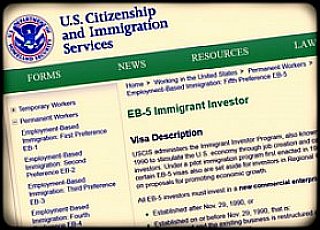
Let's say that there is an imaginary businessman, Uncle Joe. He bought a shabby bar and grill, down by the docks, for $345,000 earlier this year. He has made a couple of similar financial moves in recent years, and each of his bars seems to be growing in revenue (from a small base) by 20 percent or more a year; and two of them are grossing $500,000 a year. (The 20 percent gains and the $500,000 gross are required in a new program.)
The latest immigrant admission decision by USCIS, the revival of an Obama era program that had been temporarily frozen by the Trump administration, is described more formally below; it is the Entrepreneur Parole program and it gives Uncle Joe, and his relatives, multiple opportunities:
- Joe can unload $155,250 of the cost of the newest bar on three of his nephews from the old country;
- Each of the nephews, now averaging 40 years of age, can migrate to the United States, get work permits for themselves, their spouses, and each of the three teenagers in each family for an investment in the bar of $51,750 per nephew;
- The three nephews could take turns as the associate manager of the establishment; i.e., as the bartender on duty, thus taking part in the management of the enterprise; and
- A grand total of 15 work permits would be issued to these aliens, all in exchange for $155,250 in new investment, or at a rate of a little over $10,000 per visa.
All of this makes the $500,000 minimum investment in the EB-5 program look like a very expensive proposition; but with EB-5 the investor gets a green card after two years; the new system provides two successive 30-month parole periods of legal residence.
My example of how this new immigration program might work is a grittier version of the more formal description in the National Law Review, which follows:
On December 14, 2017, U.S. Citizenship and Immigration Services ("USCIS") announced that it will accept applications for the new Entrepreneur Parole program. Through this program, entrepreneurs and their families can come to the U.S. for up to five years, in two thirty-month increments.
Under the instructions just released by USCIS, entrepreneurs will need to own 15% of a start-up entity incorporated in the last three years. The entrepreneur will need to have some day-to-day role in the company, and the start-up will need to be capitalized by at least $345,000 U.S.-based private funding or $100,000 U.S. (Federal, State, or Local) government funding. Up to three entrepreneurs from each start-up can apply.
Don't blame this program on the Trumps. It was set in motion in the last year of the Obama administration, suspended by the new administration, and then revived after a court ruling that the suspension was unlawful. It might well be suspended again. It should be.
One of the odd things about this parole problem — over and above the remarkably small amount of money required of the aliens — is the strong focus on the nature and characteristics of the citizen or green card investor who puts up 85 percent of the money (in cases where only one alien investor is involved). While there are detailed rules about the resident investor's past successes and the extent of his or investment (e.g., 20 percent in annual revenue gains), there appear to be few for the alien investor. Does he or she need to speak English, does he or she need a college degree, or a patent, or a copyright? Not that I could tell. The program does have some rules about relatives — the U.S. investor cannot be the parent or the sibling of the alien.
Another odd thing is the provision for a lower amount of investment if a unit of government has "funded" the operation to the extent of $100,000 or so. A governmental at-risk investment in a private-sector activity would be unusual. Or is it a loan? I can see a city, in which the senior member of the city council is Joe's brother, for example, lending Joe 100 grand at a low rate to reduce the investment his nephews must make. Or, without any nepotism, the city might charge Joe above-market interest rates, knowing that the presence of the city money will reduce the investments of the relatives. Strange.
There are the usual job creation requirements; perhaps they will be gamed as they are in the EB-5 program.
So the program does not require the alien investor to have hard skills, or much money; what the alien needs is good connections to a qualified resident investor.
It is perfectly possible, of course, that instead of Uncle Joe, the sponsor is a razor-sharp hedge fund; that there will be a single alien, not 15 as in my scenario; and that instead of being a bartender, the alien investor will be a software whiz.
While EB-5 produces passive investors, this will tilt toward aliens with connections to resident money. It may facilitate the admission of some useful entrepreneurs, but is more likely to attract alien friends (and relatives) of U.S. business people.
This program is worldwide in scope, unlike the somewhat similar Treaty Investor program. In this program, unlike the former, no treaty is needed and therefore Chinese, among others, may apply. Further, unlike the EB-5 program, there are no numerical limits, and current Chinese EB-5 applicants can also apply for this status while staying in the EB-5 waiting queue. This last element presumably will cause the powerful EB-5 lobby to support this dubious program.
